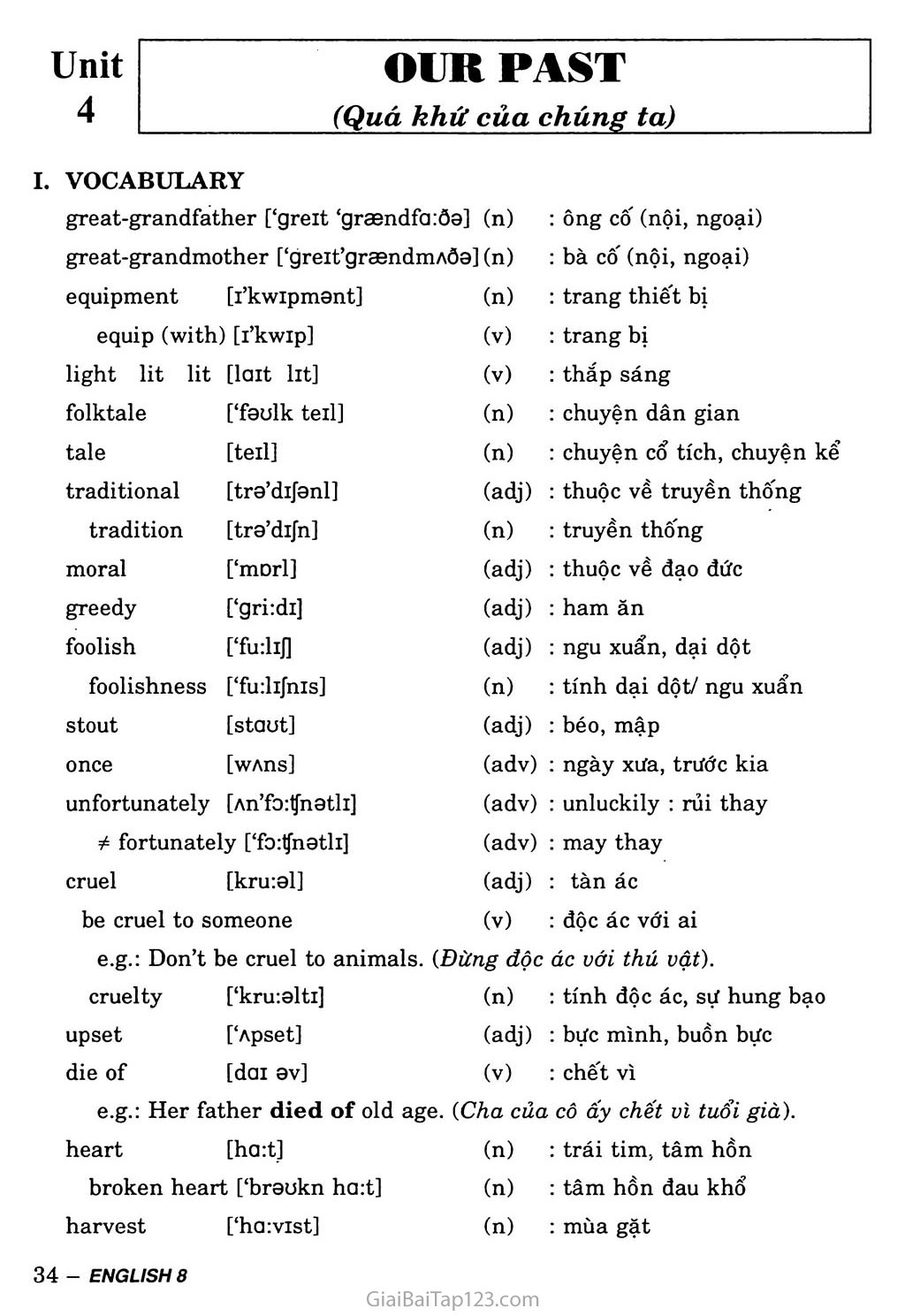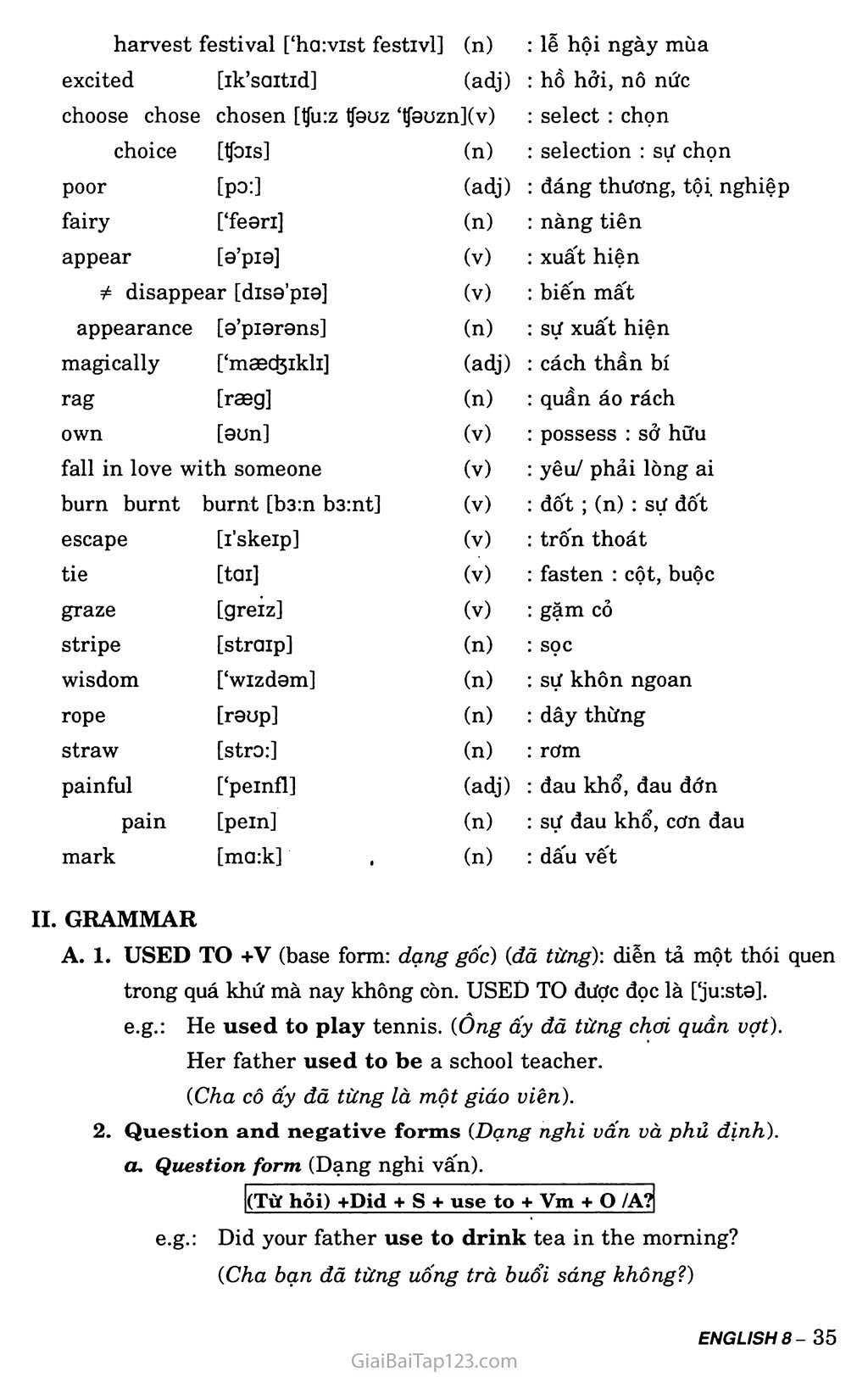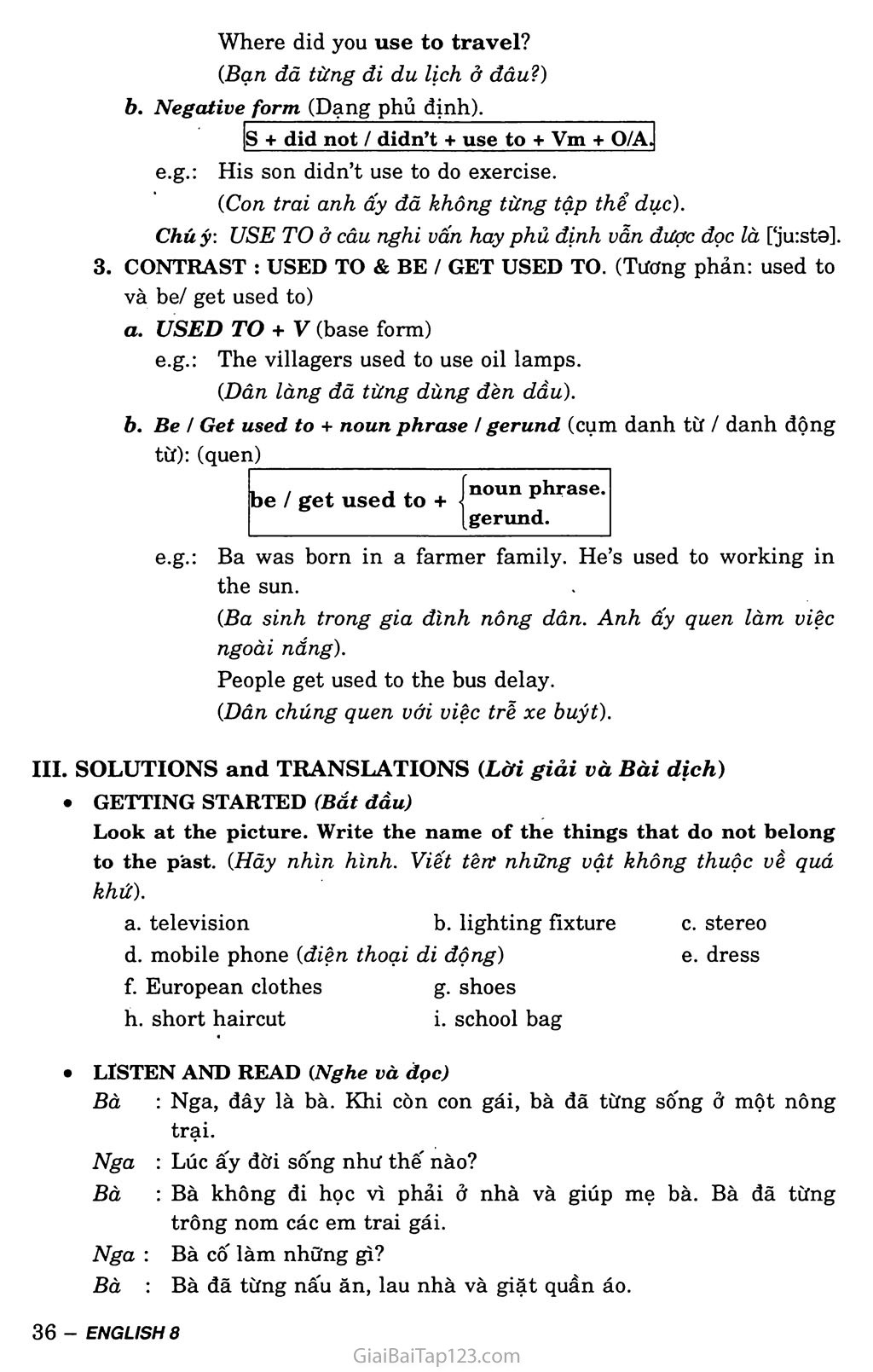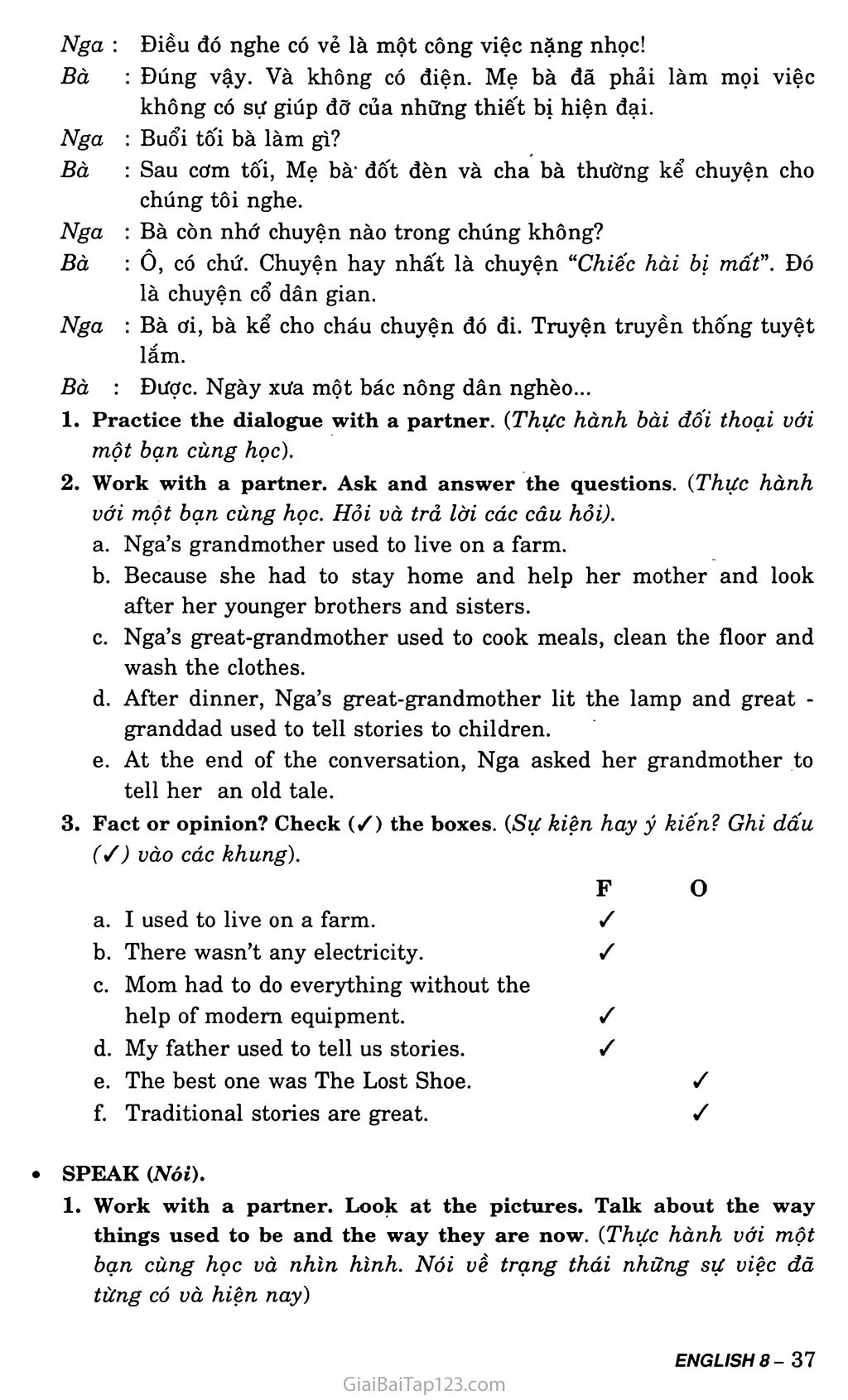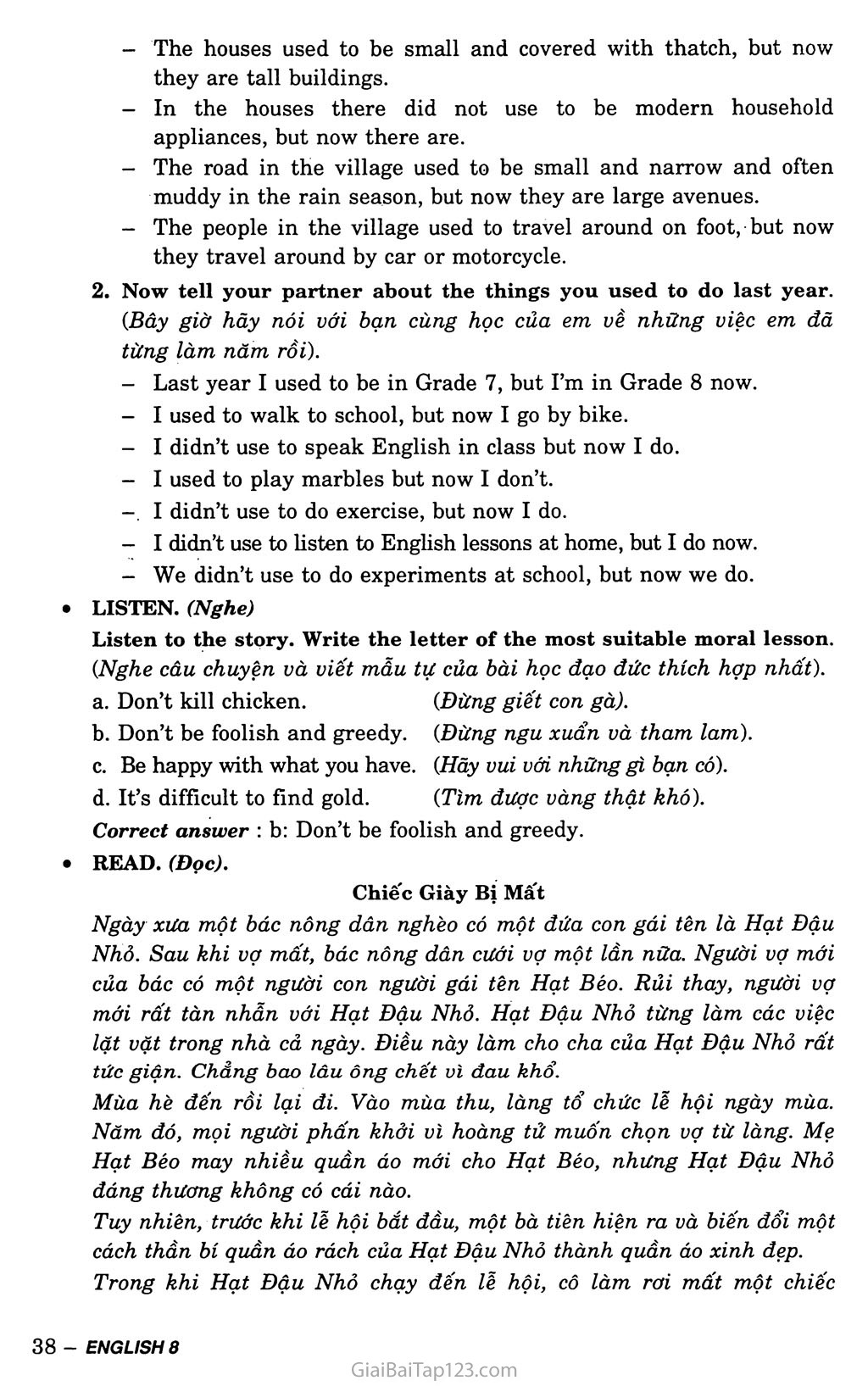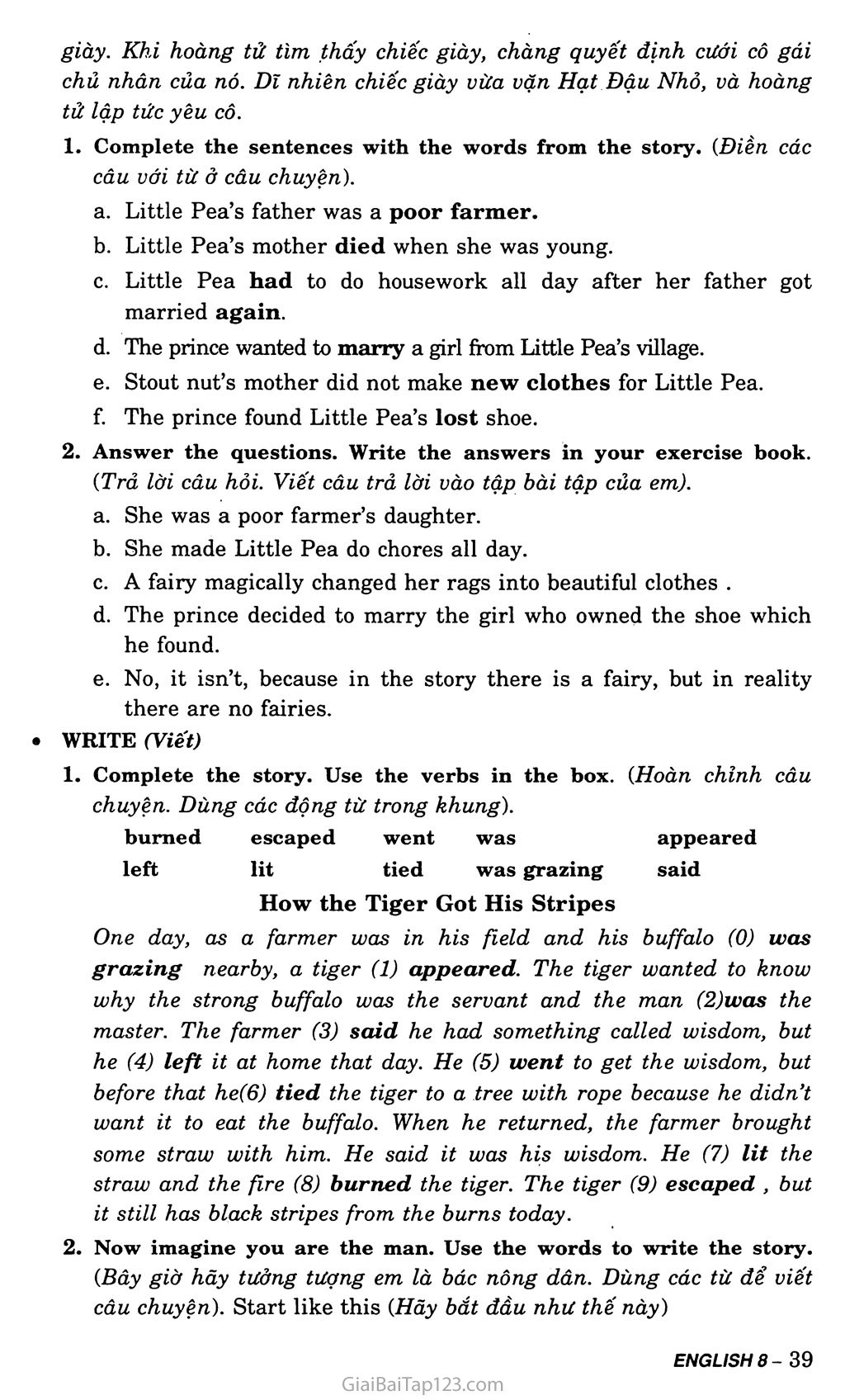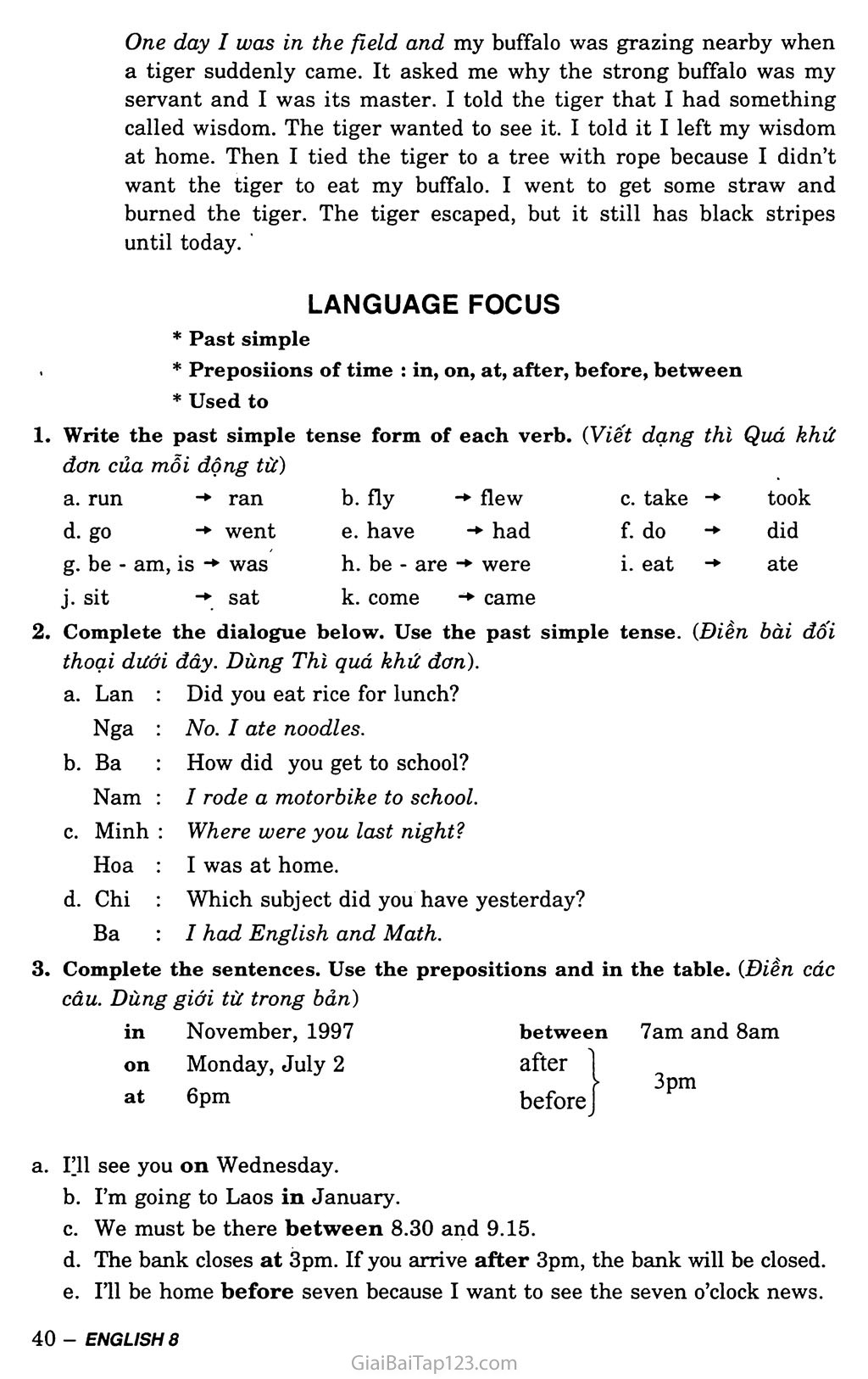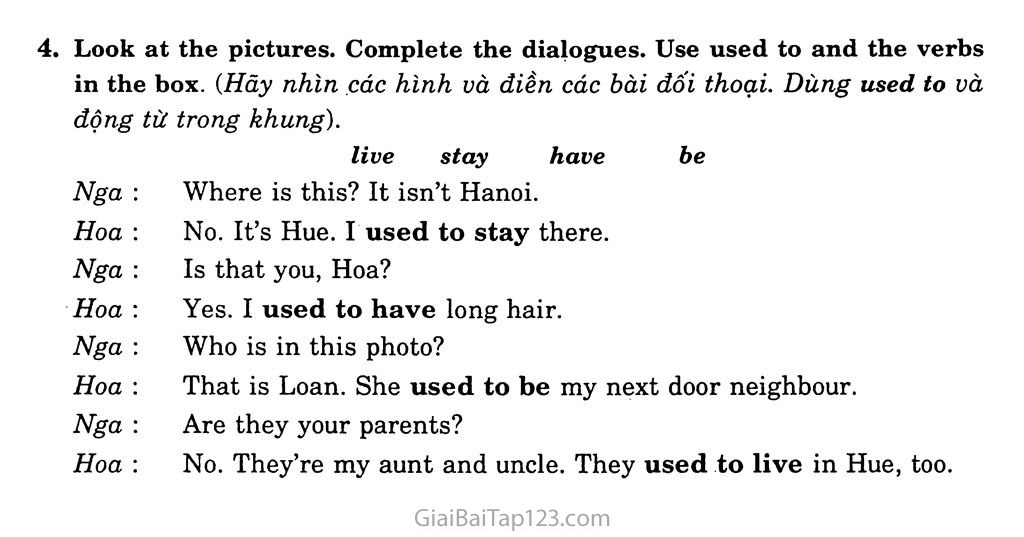Giải tiếng Anh lớp 8 Unit 4: Our Past
Unit
4
OUR PAST
I.
(Quá khứ của chúng ta)
equipment
[I’kwipmant]
(n)
trang thiết bị
equip (with) [fkwip]
(v)
trang bị
light lit lit
[lait lit]
(v)
thắp sáng
folktale
[‘faulk tell]
(n)
chuyện dân gian
tale
[tell]
(n)
chuyện cổ tích, chuyện kể
traditional
[tra’difanl]
(adj)
thuộc về truyền thống
tradition
[tra’difn]
(n)
truyền thông
moral
[‘mDrl]
(adj)
thuộc về đạo đức
greedy
[‘gri:di]
(adj)
ham ăn
foolish
[‘furlij]
(adj)
ngu xuẩn, dại dột
foolishness
[‘fudifms]
(n)
tính dại dột/ ngu xuẩn
stout
[staut]
(adj)
béo, mập
once
[wAns]
(adv)
ngày xưa, trước kia
unfortunately
[An’fa:tfnatli]
(adv)
unluckily : rủi thay
fortunately [‘fa:tfnatli]
(adv)
may thay
cruel
[kru:al]
(adj)
tàn ác
be cruel to someone
(v)
độc ác với ai
e.g.: Don’t be cruel to animals.
{Đừng dộc ác với thú vật).
cruelty
t‘kru:alti]
(n)
tính độc ác, sự hung bạo
upset
[‘Apset]
(adj)
bực mình, buồn bực
die of
[dai av]
(v)
chết vì
VOCABULARY
great-grandfather [‘greit ‘graendícrổa] (n) great-grandmother [‘greit’graendmAda] (n)
ông cố’ (nội, ngoại) bà cô’ (nội, ngoại)
e.g.: Her father died of old age. {.Cha của cô ấy chết vì tuổi già).
heart
[ha:t]
(n)
: trái tim, tâm hồn
broken heart [‘braukn ha:t]
(n)
: tâm hồn đau khổ
harvest
[‘ha:vist]
(n)
: mùa gặt
harvest festival [‘ha:vist festivl]
(n)
lễ hội ngày mùa
excited
[ik’saitid]
(adj)
hồ hởi, nô nức
choose chose
chosen [tfu:z Ifauz ‘Ịfaơzn](v)
select : chọn
choice
[fois]
(n)
selection : sự chọn
poor
[pa:]
(adj)
đáng thương, tội. nghiệp
fairy
1‘feari]
(n)
nàng tiên
appear
[a’pia]
(v)
xuất hiện
disappear [disa’pia]
(V)
biến mất
appearance
[a’piarans]
(n)
sự xuất hiện
magically
[‘mascfeikli]
(adj)
cách thần bí
rag
[rseg]
(n)
quần áo rách
own
(sun]
(v)
possess : sở hữu
fall in love with someone
(v)
yêu/ phải lòng ai
burn burnt
burnt [b3:n b3:nt]
(v)
đốt ; (n) : sự đốt
escape
[iskeip]
(v)
trốn thoát
tie
[tai]
(v)
fasten : cột, buộc
graze
[greiz]
(v)
gặm cỏ
stripe
[straip]
(n)
sọc
wisdom
[‘wizdam]
(n)
sự khôn ngoan
rope
[raup]
(n)
dây thừng
straw
[stro:]
(n)
rơm
painful
[‘peinfl]
(adj)
đau khổ, đau đớn
pain
[pein]
(n)
sự đau khổ, cơn đau
mark
[ma:k]
(n)
dấu vết
GRAMMAR
A. 1. USED TO +v (base form: dạng gốc) {đã từng)-, diễn tả một thói quen
trong quá khứ mà nay không còn. USED TO được đọc là [‘ju:sta].
g.: He used to play tennis. {Ông ấy đã từng chai quần vợt).
Her father used to be a school teacher.
{Cha cô ấy đã từng là một giáo viên).
2. Question and negative forms {Dạng nghi vấn và phủ định), a. Question form (Dạng nghi vấn).
[(Từ hỏi) +Did + s + use to + Vm + o /A?[
g.: Did your father use to drink tea in the morning?
{Cha bạn đã từng uống trà buổi sáng không'?)
Where did you use to travel?
{Bạn đã từng đi du lịch ở đâu?)
b. Negative form (Dạng phủ định).
|s + did not / didn’t + use to + Vm + O/A.Ị
g.: His son didn’t use to do exercise.
{Con trai anh ấy đã không từng tập thể dục).
Chú ỷ: USE TO ở câu nghi vấn hay phủ định vẫn được đọc là [‘ju:sts]. 3. CONTRAST : USED TO & BE / GET USED TO. (Tương phản: used to
và be/ get used to)
USED TO +v (base form)
e.g.: The villagers used to use oil lamps.
{Dân làng đã từng dùng đền dầu).
Be / Get used to + noun phrase I gerund (cụm danh từ / danh động
từ): (quen)
be / get used to +
noun phrase, gerund.
e.g.: Ba was born in a farmer family. He’s used to working in the sun.
{Ba sinh trong gia đỉnh nông dân. Anh ấy quen làm việc ngoài nắng).
People get used to the bus delay.
{Dân chúng quen với việc trễ xe buýt).
SOLUTIONS and TRANSLATIONS (Lời giải và Bài dịch)
GETTING STARTED (Bắt đầu)
Look at the picture. Write the name of the things that do not belong to the past. (Hãy nhìn hình. Viết tên những vật không thuộc về quá khứ).
television b. lighting fixture c. stereo
mobile phone (điện thoại di động) e. dress
European clothes g. shoes
h. short haircut i. school bag
LISTEN AND READ (Nghe và dọc)
Bà : Nga, đây là bà. Khi còn con gái, bà đã từng sông ở một nông
trại.
Nga : Lúc ấy đời sông như thế nào?
Bà : Bà không đi học vì phải ở nhà và giúp mẹ bà. Bà đã từng trông nom các em trai gái.
Nga : Bà cố làm những gì?
Bà : Bà đã từng nấu ăn, lau nhà và giặt quần áo.
Nga : Điều đó nghe có vẻ là một công việc nặng nhọc!
Bà : Đúng vậy. Và không có điện. Mẹ bà đã phải làm mọi việc không có sự giúp đỡ của những thiết bị hiện đại.
Nga : Buổi tối bà làm gì?
Bà : Sau cơm tối, Mẹ bà’ đốt đèn và cha bà thường kể chuyện cho chúng tôi nghe.
Nga : Bà còn nhớ chuyện nào trong chúng không?
Bà : 0, có chứ. Chuyện hay nhất là chuyện “Chiếc hài bị mất”. Đó là chuyện cổ dân gian.
Nga : Bà ơi, bà kể cho cháu chuyện đó đi. Truyện truyền thông tuyệt lắm.
Bà : Được. Ngày xưa một bác nông dân nghèo...
Practice the dialogue with a partner. {Thực hành bài đối thoại với một bạn cùng học).
Work with a partner. Ask and answer the questions. {Thực hành với một bạn cùng học. Hỏi và trả lời các câu hỏi).
Nga’s grandmother used to live on a farm.
Because she had to stay home and help her mother and look after her younger brothers and sisters.
Nga’s great-grandmother used to cook meals, clean the floor and wash the clothes.
After dinner, Nga’s great-grandmother lit the lamp and great - granddad used to tell stories to children.
At the end of the conversation, Nga asked her grandmother to tell her an old tale.
Fact or opinion? Check (Z) the boxes. (Sự kiện hay ý kiến? Ghi dấu (/) vào các khung).
F o
• SPEAK {Nói).
Work with a partner. Look at the pictures. Talk about the way things used to be and the way they are now. {Thực hành với một bạn cùng học và nhìn hình. Nói về trạng thái những sự việc đã từng có và hiện nay)
The houses used to be small and covered with thatch, but now they are tall buildings.
In the houses there did not use to be modern household appliances, but now there are.
The road in the village used to be small and narrow and often muddy in the rain season, but now they are large avenues.
The people in the village used to travel around on foot, but now they travel around by car or motorcycle.
Now tell your partner about the things you used to do last year. (Bây giờ hãy nói với bạn cùng học của em về những việc em đã từng làm nấm rồi).
Last year I used to be in Grade 7, but I’m in Grade 8 now.
I used to walk to school, but now I go by bike.
I didn’t use to speak English in class but now I do.
I used to play marbles but now I don’t.
I didn’t use to do exercise, but now I do.
I didn’t use to listen to English lessons at home, but I do now.
We didn’t use to do experiments at school, but now we do.
LISTEN. (Nghe)
Listen to the story. Write the letter of the most suitable moral lesson.
(Nghe câu chuyện và viết mẫu tự của bài học đạo đức thích hạp nhất).
Don’t kill chicken.
Don’t be foolish and greedy.
Be happy with what you have.
It’s difficult to find gold.
(Đừng giết con gà).
(Đừng ngu xuẩn và tham lam). (Hãy vui với những gì bạn có). (Tìm được vàng thật khó).
Correct answer : b: Don’t be foolish and greedy.
READ. (Đọc).
Chiếc Giày BỊ Mất
Ngày xưa một bác nông dân nghềo có một đứa con gái tên là Hạt Đậu Nhỏ. Sau khi vợ mất, bác nông dân cưới vợ một lần nữa. Người vợ mới của bác có một người con người gái tên Hạt Béo. Rủi thay, người vợ mới rất tàn nhẫn với Hạt Đậu Nhỏ. Hạt Đậu Nhỏ từng làm các việc lặt vặt trong nhà cả ngày. Điều này làm cho cha của Hạt Đậu Nhỏ rất tức giận. Chẳng bao lâu ông chết vì đau khổ.
Mùa hè đến rồi lại đi. Vào mùa thu, làng tồ chức lễ hội ngày mùa. Năm đó, mọi người phấn khởi vì hoàng tử muốn chọn vợ từ làng. Mẹ Hạt Béo may nhiều quần áo mới cho Hạt Béo, nhưng Hạt Đậu Nhỏ đáng thương không có cái nào.
Tuy nhiên, trước khi lễ hội bắt đầu, một bà tiên hiện ra và biến đổi một cách thần bí quần áo rách của Hạt Đậu Nhỏ thành quần áo xinh đẹp. Trong khi Hạt Đậu Nhỏ chạy đến lễ hội, cô làm rơi mất một chiếc
giày. Khi hoàng tử tìm thấy chiếc giày, chàng quyết định cưới cô gái chủ nhân của nó. Dĩ nhiên chiếc giày vừa vặn Hạt Đậu Nhỏ, và hoàng tủ lập tức yêu cô.
Complete the sentences with the words from the story. (Điền các câu với từ ở câu chuyện).
Little Pea’s father was a poor farmer.
Little Pea’s mother died when she was young.
Little Pea had to do housework all day after her father got married again.
The prince wanted to marry a girl from Little Pea’s village.
Stout nut’s mother did not make new clothes for Little Pea.
The prince found Little Pea’s lost shoe.
Answer the questions. Write the answers in your exercise book. (Trả lời câu hỏi. Viết câu trả lời vào tập bài tập của em).
She was a poor farmer’s daughter.
She made Little Pea do chores all day.
A fairy magically changed her rags into beautiful clothes .
The prince decided to marry the girl who owned the shoe which he found.
No, it isn’t, because in the story there is a fairy, but in reality there are no fairies.
• WRITE (Viết)
Complete the story. Use the verbs in the box. (Hoàn chỉnh câu chuyện. Dùng các động từ trong khung).
burned escaped went was appeared
left lit tied was grazing said
How the Tiger Got His Stripes
One day, as a farmer was in his field and his buffalo (0) was grazing nearby, a tiger (1) appeared. The tiger wanted to know why the strong buffalo was the servant and the man (2)was the master. The farmer (3) said he had something called wisdom, but he (4) left it at home that day. He (5) went to get the wisdom, but before that he(6) tied the tiger to a tree with rope because he didn’t want it to eat the buffalo. When he returned, the farmer brought some straw with him. He said it was his wisdom. He (7) lit the straw and the fire (8) burned the tiger. The tiger (9) escaped , but it still has black stripes from the burns today.
Now imagine you are the man. Use the words to write the story. (Bây giờ hãy tưởng tượng em là bác nông dân. Dùng các từ để viết câu chuyện). Start like this (Hãy bắt đầu như thế này)
One day I was in the field and my buffalo was grazing nearby when a tiger suddenly came. It asked me why the strong buffalo was my servant and I was its master. I told the tiger that I had something called wisdom. The tiger wanted to see it. I told it I left my wisdom at home. Then I tied the tiger to a tree with rope because I didn’t want the tiger to eat my buffalo. I went to get some straw and burned the tiger. The tiger escaped, but it still has black stripes until today.
LANGUAGE FOCUS
Past simple
. * Preposiions of time : in, on, at, after, before, between
Used to
1. Write the past simple tense form of each verb. (Viết dạng thì Quá khứ đơn của mỗi động tù')
a. run
-*• ran
b. fly
-» flew
c.
take
-*
took
d. go
-* went
e. have
-* had
f.
do
->
did
g. be - am, is -* was
h. be - are
-*• were
i.
eat
ate
j. sit
-» sat
k. come
-* came
2. Complete the dialogue below. Use the past simple tense. (Điền bài đối thoại dưới đây. Dùng Thì quá khứ đơn).
a.
Lan :
Nga :
Did you eat rice for lunch?
No. I ate noodles.
b.
Ba :
How did you get to school?
Nam :
I rode a motorbike to school.
c.
Minh :
Where were you last night?
Hoa :
I was at home.
d.
Chi :
Which subject did you have yesterday?
Ba :
I had English and Math.
3. Complete the sentences. Use the prepositions and in the table. (Điền các câu. Dùng giới từ trong bản)
in
November, 1997
between
7am and 8am
on
Monday, July 2
after
3 pm
at
6pm
before
I’ll see you on Wednesday.
I’m going to Laos in January.
We must be there between 8.30 and 9.15.
The bank closes at 3pm. If you arrive after 3pm, the bank will be closed.
I’ll be home before seven because I want to see the seven o’clock news.
Look at the pictures. Complete the dialogues. Use used to and the verbs in the box. {Hãy nhln các hình và điền các bài đối thoại. Dùng used, to và động từ trong khung).
live stay have be
Nga : Where is this? It isn’t Hanoi.
Hoa : No. It’s Hue. I used to stay there.
Nga : Is that you, Hoa?
Hoa : Yes. I used to have long hair.
Nga : Who is in this photo?
Hoa : That is Loan. She used to be my next door neighbour.
Nga : Are they your parents?
Hoa : No. They’re my aunt and uncle. They used to live in Hue, too.

